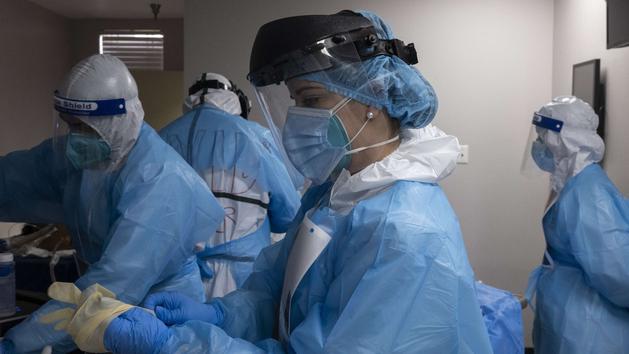Faced with the "
massive influx of Covid patients
", the National Consultative Ethics Committee (CCNE) recommends "
preserving access to care in the most urgent situations and to patients who would have the most to lose from an absence or of a delay in care
”in a report on the sorting of Covid and non-Covid patients, published Wednesday, November 18.
Live: LIVE - Covid-19: Pfizer / BioNTech vaccine 95% effective, according to full clinical trial results
But any discrimination linked to age, social status and chronic disability is excluded because "
the hierarchy of the value of life must remain an ethical '' prohibition ''
".
The Committee is in favor of prioritization decisions "
on a case-by-case basis
" in this twelve-page text responding to a referral of November 3 from the Minister of Health on "
the care of Covid and non-Covid patients in the epidemic context leading to a significant number of patients in health establishments.
"
The problem of access to healthcare for all, already present before the crisis, is particularly acute during this pandemic and highlights the limits of hospital capacities and of the entire health system
", notes the CCNE.
The question of access to resuscitation, “
the most visible and the most tragic
”, is only the “
tip of the iceberg
”.
Because "
the tension is present in all hospital services which must decide which patients are to be treated urgently and which patients can wait or see their care modified, to make room for '' Covid patients ''
".
Read also: Covid-19: France is still "far from deconfinement" according to the government spokesperson
The Committee points to the limits of this strategy during the first wave, by evoking “
excess mortality
” among non-Covid patients, “
in particular for patients suffering from coronary heart disease, but also for patients with cancer whose processing has been delayed
”.
"
There are undoubtedly many other + invisible and collateral victims + of this epidemic, patients not or less well taken care of
", he notes.
CCNE recommends in particular the optimization of access to care by strengthening coordination between city stakeholders, public and private hospitals and medico-social establishments, consultation with user representatives and written traceability of decisions.
As in his report of March 13, he advocates "
ethical support
" for teams called upon to make choices "
and to establish
" feedback "
to assess the
" consequences of decision-making choices and loss of opportunity for them. 'Covid patients' 'and other patients'.
“The choices and the criteria should not be assumed by the medical profession alone.
The question of the inadequacy of resources with regard to needs will have to be discussed after the crisis: it is an ethical public health issue, "he concludes.
Read also: Covid-19: in intensive care, "pushing the walls to treat everyone"












/cloudfront-eu-central-1.images.arcpublishing.com/prisa/KMEYMJKESBAZBE4MRBAM4TGHIQ.jpg)

